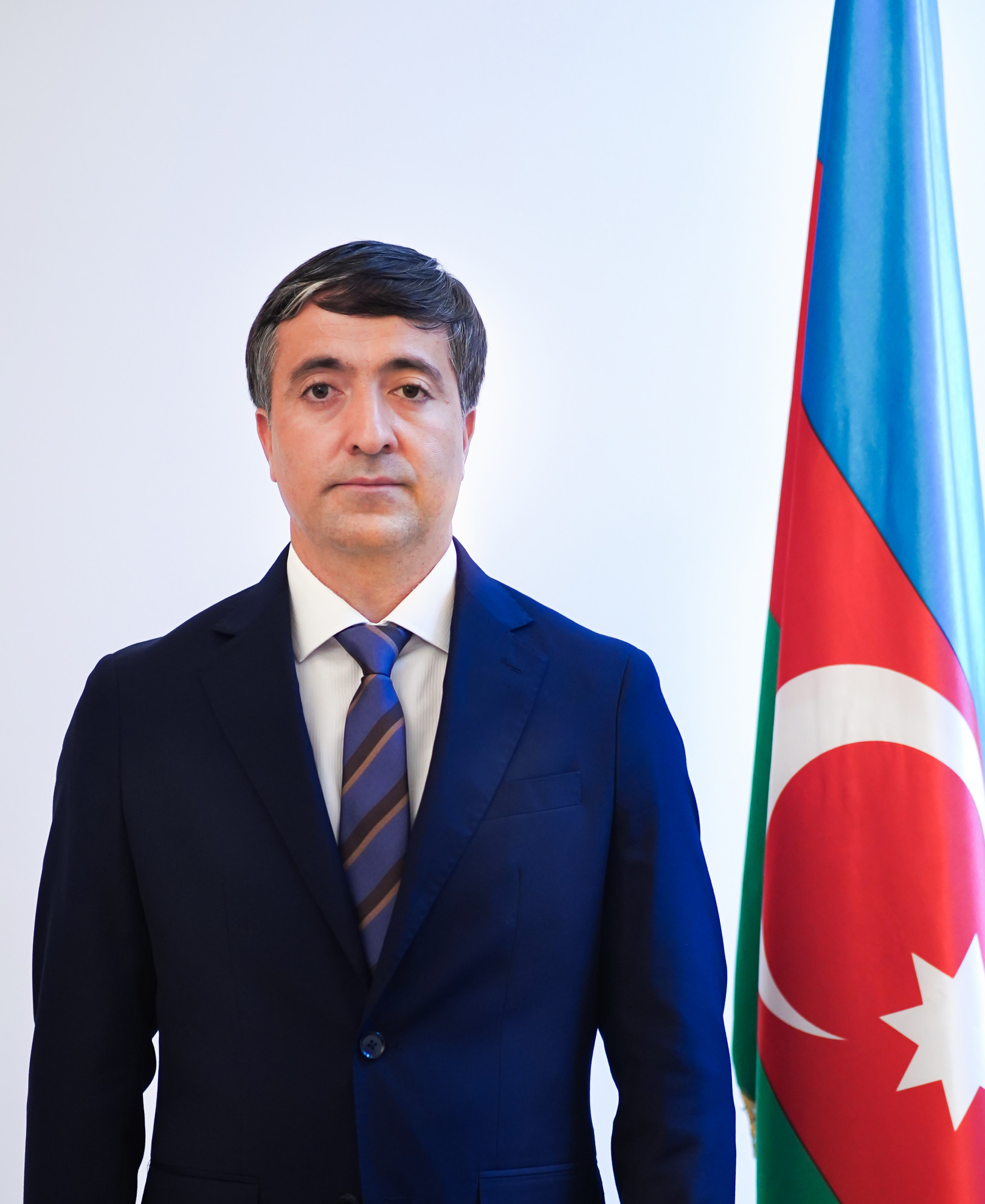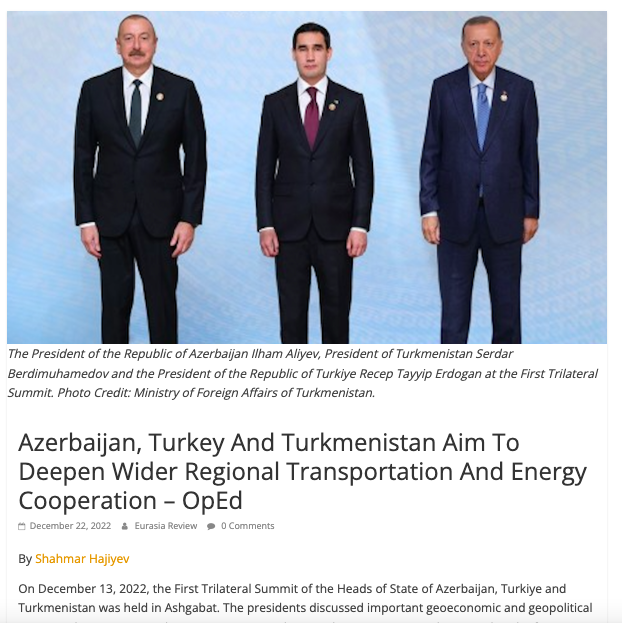On December 13, 2022, the First Trilateral Summit of the Heads of State of Azerbaijan, Turkiye and Turkmenistan was held in Ashgabat. The presidents discussed important geoeconomic and geopolitical issues such as energy, trade, transportation and regional security. It is worth noting that the first Azerbaijan-Turkiye-Turkmenistan trilateral summit was a historical meeting amid the current situation in the global energy markets. As evidence for this, energy and transportation ministers of these countries also discussed in a separate meeting the future energy and transportation potential in the region, and how to deepen wider regional cooperation.
The Central Asia and South Caucasus region have a strong potential to be an alternative source of energy supply to the European energy markets. Especially, Turkmenistan with the fourth-largest reserves of natural gas in the world could be a real game changer for energy-hungry Europe. In 2021, Ashgabat produced 79.3 billion cubic meters (bcm) of natural gas, of which the country consumed 36.7 bcm. Accordingly, energy cooperation between Azerbaijan, Turkiye and Turkmenistan would allow Ashgabat to export natural gas not only to traditional energy markets such as Russia and China but also to Europe.
Rapprochement between Baku and Ashgabat after the signing of the “Memorandum of Understanding on joint exploration and development of Dostlug” field in Caspian Sea last year was a signal for the future cooperation. The signed document solved long-lasting dispute between Azerbaijan and Turkmenistan in the Caspian Sea and opened up new opportunities for a wider regional cooperation. To this end, the last year, Azerbaijan, Iran, and Turkmenistan also signed a trilateral agreement on a gas swap under which Iran annually delivers 1.5 to 2 bcm of Turkmen gas to Azerbaijan. From January 3, 2022, supplies of 5-6 million cubic meters (mcm) of gas per day began as part of the deal. Iran receives Turkmen gas in the east of the country and further delivers an equivalent amount to Azerbaijan.
So far, two important issues were high on the agenda during the Ashgabat summit. The first one was the energy cooperation between the three countries, which is very important for future energy security and economic development. Finalization of the Southern Gas Corridor (SGC) was the major catalyst for the Turkmenistan-Azerbaijan energy rapprochement. Azerbaijan became the first country to export Caspian natural gas to the European energy markets bypassing Russia. SGC, with all its segments is a strategic inter-regional energy project connecting the Caspian region directly to Europe. The Trans-Anatolian Natural Gas Pipeline (TANAP) and the Trans Adriatic Pipeline (TAP) are source of diversification for Turkish and European energy consumers, therefore energy cooperation with Azerbaijan opens up new opportunities for Central Asian region to export energy resources to Turkiye and Europe.
As noted by the president of Turkiye Recep Tayyip Erdoğan, “the Trans-Anatolian Gas Pipeline, which transports Azerbaijani gas to Turkiye, has already reached its capacity of 32 bcm. Since the Trans Adriatic Pipeline transporting gas to Europe through Greece has also reached its limit of 6 bcm, it is essential to establish a new route to realize a sufficient flow of natural gas over the region. For Turkiye, the current situation is a substantial opportunity to become a gas trade hub using Turkmen gas to supply Europe with energy sources”. It shows that energy cooperation is very important for Turkiye because Ankara will meet both growing natural gas demand and become a transit country.
For Turkmenistan, energy cooperation is also very important, as it will also increase Turkmenistan’s export options. According to the results of 2021, natural gas export in Turkmenistan, China was the main export route with nearly 31 bcm/y, and after China, Russia with 10 bcm/y. As it is seen the country is very dependent on natural gas exports, and new energy markets are significant for diversification. Doing that, Turkmenistan will have a more favorable position in gas export negotiations with Moscow and Beijing. In addition, this process will create an incentive to attract new technologies and experts to Turkmenistan for the development of new gas projects.
Another major topic was cooperation in the field of transport. Azerbaijan is an active participant in the East-West and North-South transport corridors. In fact, the ongoing Russia-Ukraine war negatively affected on the Northern Corridor. The EU and US sanctions against Moscow have had a serious impact on international transport and cargo transportation. The traditional trade routes have lost their relevance, the direction of international East–West cargo transportation has changed, and a lot of cargo flow has been diverted from the north to the south. Following the sanctions, one can see the growth of cargo volume in freight transportation along the Trans-Caspian International Transport Route (TITR) or Middle Corridor.
In this context, Azerbaijan- Turkiye-Turkmenistan cooperation is a very effective and important format to further develop transport corridors. Also, cooperation in the Lapis-Lazuli international transit route format further strengthens Georgia-Turkmenistan-Azerbaijan-Afghanistan cooperation. Afghanistan, Turkmenistan, Azerbaijan, Georgia, and Turkiye signed an agreement in 2017 on the creation of the Lapis Lazuli transport corridor, which is set to connect the five countries. In addition, in January, 2021, Turkmenistan, Azerbaijan and Afghanistan signed an agreement on a tripartite roadmap for deeper cooperation on the Lapis Lazuli Corridor. As a part of Eurasian connectivity and the Middle Corridor, the Lapis Lazuli transport corridor will serve to deepen regional integration by creating new opportunities to increase trade volume. The multimodal East–West Lapis Lazuli corridor, which originates in Afghanistan, is composed of overland routes that pass-through Turkmenistan followed by ferry connections across the Caspian Sea to Azerbaijan; from there, goods continue by rail to Georgia, Turkey, and, potentially, on to Europe. The ports of Alat and Turkmenbashi in the Caspian Sea play an important role in transporting cargo from Central Asia to Europe.
It is very important to underline that especially, the Middle Corridor gained value after the crisis in the northern corridor amid the Russia-Ukraine war. To this end, Azerbaijan-Turkiye -Turkmenistan have a strategic position and advantage across the region regarding the transportation, energy and trade corridors. Therefore, the Middle Corridor is a crucial strategic transit project for Central Eurasia. Also, it brings a complimentary route to the northern and southern alternatives as well as supplements China-Central Asia-West Asia Economic Corridor under the Belt and Road Initiative (BRI). Middle Corridor presents faster and shorter connection to Balkans, as well as Western and Northern Europe. It is obvious that wider regional cooperation is vital for economic integration and access to the EU’s single market.
To sum up, joint energy and transport projects will only strengthen all three countries’ geopolitical importance and economic development. Natural gas from Turkmenistan can feed up SGC, which is an important source of energy for Europe and Turkiye. Cooperation between Azerbaijan-Turkiye-Turkmenistan will also support Middle Corridor, which is important transportation route. Azerbaijan has already implemented strategically important transport projects such as the Baku-Tbilisi-Kars Railway, Alat Free Economic Zone and Alat port, and planned new infrastructure projects in the Karabakh Economic Region, including the opening of Zangezur Corridor, which will support connectivity across the region by providing Turkiye a direct route to South Caucasus and Central Asia. Briefly, regional economic integration and infrastructure connectivity are of vital importance for ensuring the stability and prosperity, and all those energy and transport projects support this initiative across the region.








